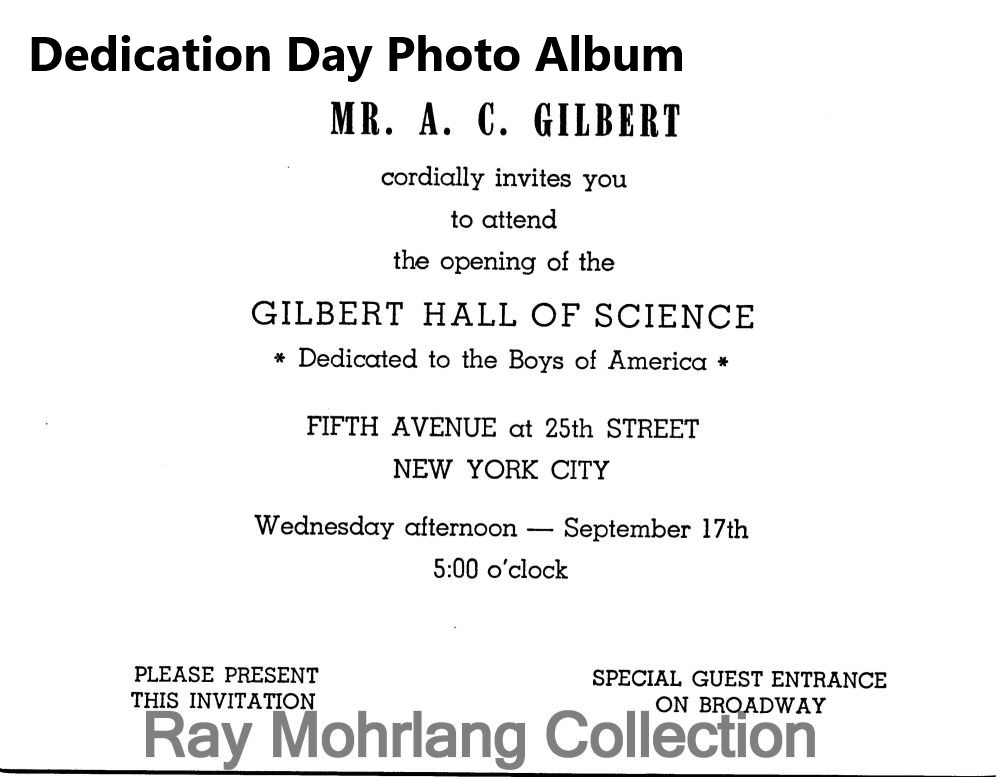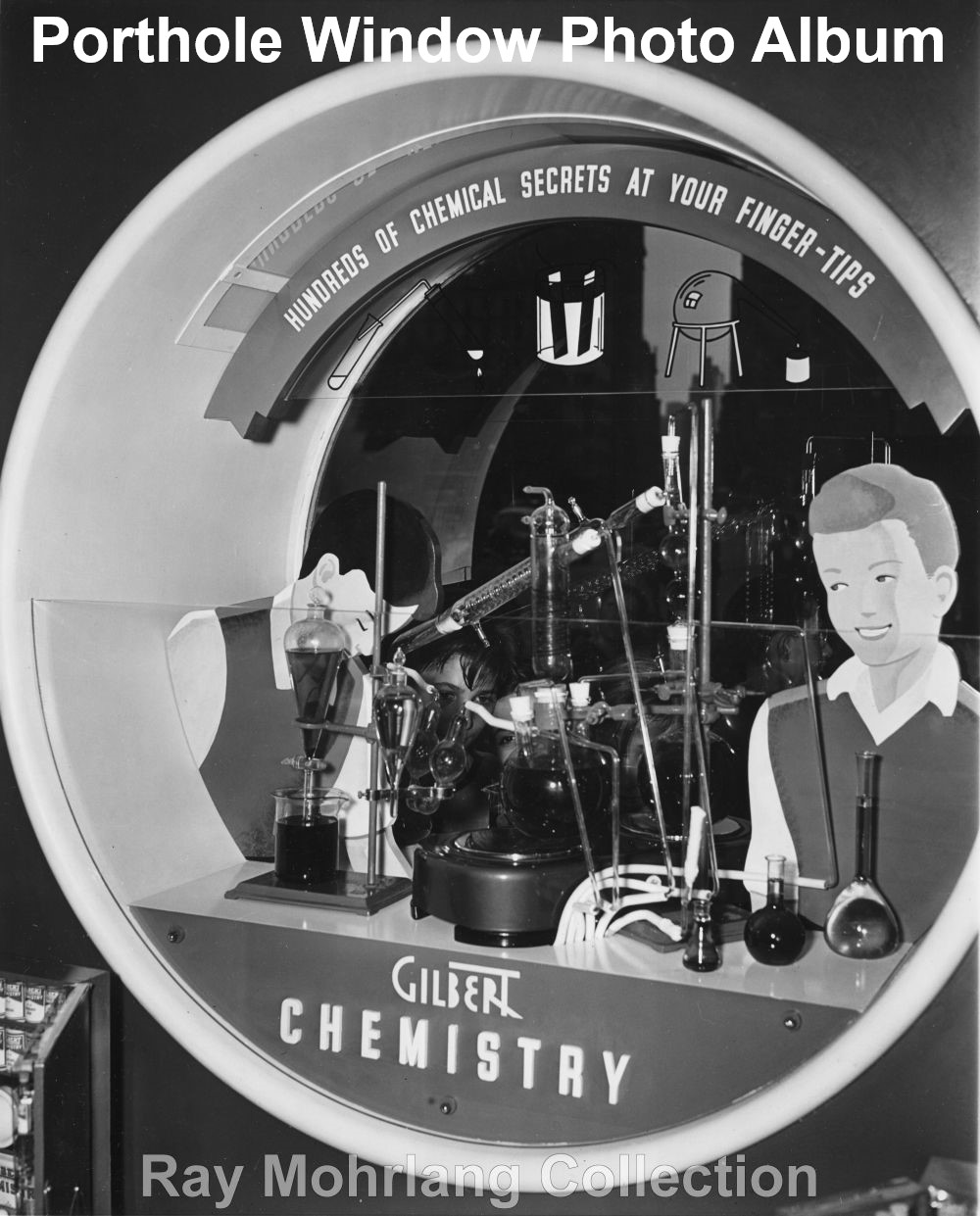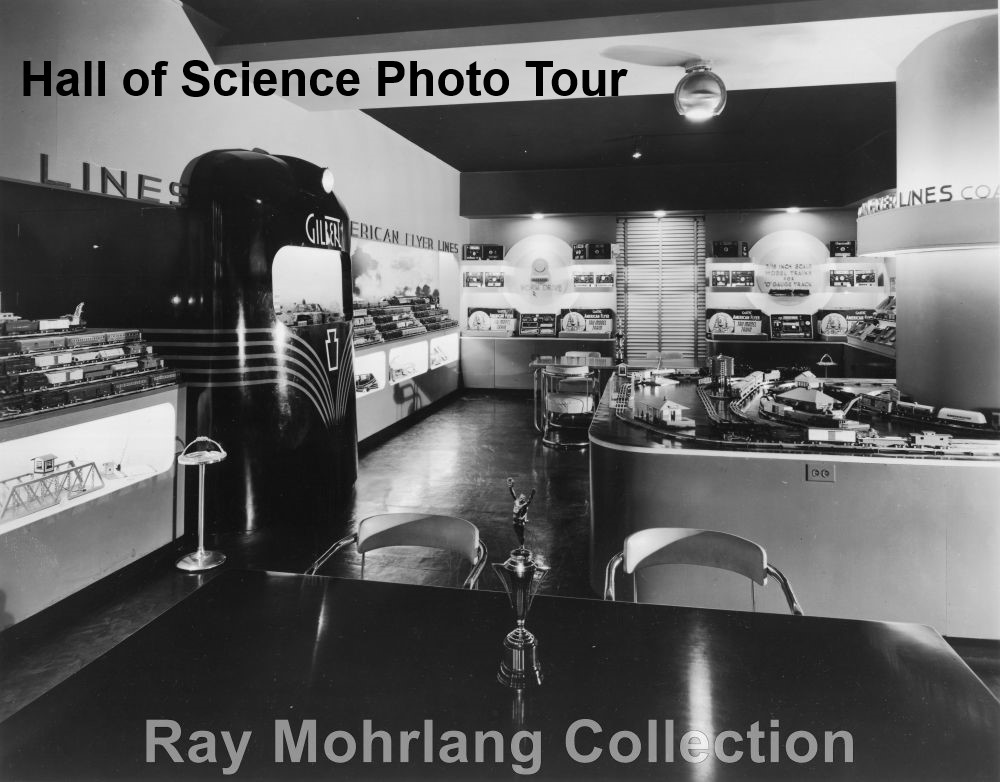The New York Hall of Science

Opening Day Crowds at the Hall of Science in New York
Since this was the most well known of the Halls of Science, it is appropriate to say a bit more about it here before we visit the layouts that were featured there at various times. Aside from American Flyer trains, it featured all of the other Gilbert products on various floors.
This was the first and Largest of the Gilbert Halls of Science and was located in New York City where Broadway meets 5th Ave. The front of the building was on 25th Street. This Hall of Science opened on September 17, 1941, almost 3 months prior to Pearl Harbor. One of the major missions of the Hall of Science in its early days was to keep the American Flyer Trains and other Gilbert products before the public's eye during the shutdown of toy production during World War II. The biggest attraction of these Halls of Science were the layouts, which were the largest American Flyer layouts of their day and the ultimate layouts of which dreams were made.
The building and site have an interesting history. The first building was a 5 story brownstone structure, called The Worth House, after the Worth Monument which stands directly across from the 25th Street entrance. That building was home to several tenants at different times, including the New York Club, the Madison Square Bank, Cosmopolitan Magazine, the State League of Republican Clubs, and the Berlitz Language Schools. It had the same trapezoidal shape as the later building that housed the Hall of Science.
The present building, with 6 stories, was designed by architects Ely Jacques Kahn and Albert Buchman in 1918 and was occupied by the Thomas Cusack outdoor advertising firm and also by the General Outdoor Advertising Co. As we all know, A.C. Gilbert leased the space at the beginning of World War II and made his trademark renovations of the building including the circular porthole like windows on the 25th Street side of the building which housed merchandise displays and provided a look into the building. After the Hall of Science closed in 1958, Gilbert leased the first four floors to the Toy Guidance Council. (see Flat Iron Nomad below)
Since then it has been occupied by various companies, including Commodore Manufacturing & Criterion Bell and Specialty, both of which were Christmas decoration companies who had showrooms in the building. Presently it houses the showroom Porcelanosa, a firm that sells ceramic and porcelain tiles and other interior design products. (see Porcelanosa Website) This is probably a use that would please A.C. Gilbert, who was a fan of the Streamline Moderne design of his era, which influenced the interior design of the Hall of Science.
Check out these websites for more information about the history of the building and photos of it at various times in history.
For more details about this Hall of Science, I highly recommend two articles in the Train Collector's Quarterly by Bruce Manson.
|
The Gilbert Hall of Science, by Bruce Manson, with Maury Romer - Train Collector's Quarterly, Fall 1980, Vol. 26, No. 5, page 11 Link to this issue and article in the TCQ (available to TCA members only) The Gilbert Hall of Science - Update and Then Some, by Bruce Manson - Train Collector's Quarterly, October 1992, Vol. 38, No. 5, page 28 Link to this issue and article in the TCQ (available to TCA members only) |
The Dedication of the New York Hall of Science


 The
New York Hall of Science was dedicated on September 17, 1941, though
it is believed to have been open for operations since March of that
year based on information Gilbert scholar Bruce Manson found in the
toy industry press. The Ray Mohrlang Collection has many
photos taken on dedication day and they have been compiled into a
slide show you can view by clicking on the invitation at the left or
on the button above.
The
New York Hall of Science was dedicated on September 17, 1941, though
it is believed to have been open for operations since March of that
year based on information Gilbert scholar Bruce Manson found in the
toy industry press. The Ray Mohrlang Collection has many
photos taken on dedication day and they have been compiled into a
slide show you can view by clicking on the invitation at the left or
on the button above.
The First Floor Layouts in New York



During the time that the New York Hall of Science was in operation from 1941 to 1958, there were a succession of layouts on the first floor, which were open to the public. In total there were three major O or S layouts and some smaller layouts, including at least one HO layout. Much of the information on the layouts was derived from the Train Collector's Quarterly articles by Bruce Manson cited in the footnotes of the sections covering each of these layouts. Other information and photographs were obtained from Ray Mohrlang, the owner of a very large collection of photos of many Gilbert display layouts. The articles are an excellent source of information on all three layouts. We certainly need more information on these layouts, so if you can help by providing any information or photographs of these layouts, please let me know at the "Contact Us" link on the home page.
The Second Floor Layout in New York

This layout was for advertising and promotion purposes and was not open to the public. It was where buyers of major retailers were taken to be shown the latest American Flyer products. Ironically, though, it is the one that is best preserved in the photos used in catalogs and other advertising and the filmed footage used in the Boys' Railroad Club television show.
HO Layouts in New York


When the Hall of Science first opened in 1941, there were two HO displays. The first one was located behind glass windows on the first floor. The second, was located in a kiosk made to resemble the front end of a GG1 locomotive. In later years, HO train displays were incorporated into both the Super Layout on the first floor and the Sales Layout on the second floor. For more details click on the links above.

